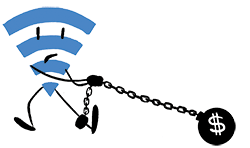Good WiFi is good business
Roula Khalaf, Editor of the FT, selects her favourite stories in this weekly newsletter.
Last month I stayed in two über-trendy hotels, one in Berlin, one in London. What sticks out in my mind from both is their lobbies, restaurants and coffee areas: every single chair, every ledge, every flat surface had been colonised by 28½-year-olds gazing into open laptops, buds in their ears and a phone or slate to the side. The only exceptions were obviously agitated 28½-year-old men and women standing in the lobby obviously awaiting a (cough cough) Tinder or Grindr hook-up.
Oh, and nobody was talking to anyone.
The only sound was the tippy-tap of MacBook Pro keys editing a sound file or sorting out photo files. Was this kind of creepy? Yes. Yes it was. Spooky, too. And then I got over the spookiness and began to see the rooms before me as a gentleman’s club in 1900, with everyone reading newspapers in total silence – this is just the 21st-century version, except this one contains women and some sense of limitlessness. And then I got to thinking that these 28.5-somethings could have been upstairs in their rooms with their laptops doing what they were doing, except they chose to be downstairs among their own kind, finding warmth in numbers. It was actually uplifting and made me feel good about people wanting to be with people, albeit dressed up slightly on the hot side, but then one never knows when Tinder or Grindr might buzz.
…
Two weeks ago, Marriott International Inc was fined $600,000 after someone alerted the Federal Communications Commission that its Gaylord Opryland Resort and Convention Center in Nashville had a device that blocked conventioneers from setting up their own WiFi hot spots, forcing them to instead use the Marriott’s WiFi service, at $250 to $1,000 per device. Marriott’s excuse? It was protecting guests from “rogue wireless hotspots that can cause degraded service, insidious cyber attacks and identity theft”. Oddly, Marriott still believes it committed no wrong, fine notwithstanding. [Insert gales of laughter here.]
…

I don’t turn on the TV set in a hotel room any more, nor do I use the phone. This wasn’t a conscious decision, it just sort of dawned on me recently, and I think I’m in the majority. Everything runs through my laptop or iPhone: free long-distance calls on Gmail, and all the TV and TV movies you care to bring or stream.
I suppose hotels are either very happy about this – maybe phones and TV movies were a pain in the butt – or more likely they’re very annoyed at losing a revenue golden goose. One hotel in Los Angeles charged me $5 a minute to phone Canada. When I asked about this they said, “Oh, but sir, Canada is a foreign country.”
…
I live in Vancouver and I get about 10 megs a second of internet download speed courtesy of my provider. This is pathetic but compared to most North American providers, I should count my blessings. Decades of ruthless market competition – Darwinian capitalism at its most intense – has led to an internet speed crisis so severe that many critics have likened it to a human rights violation. It seems carrying broadband is the one form of business that becomes stunted, if not entirely crippled, when placed in the hands of the free market. Ask anyone in telephony and they’ll confirm that pretty much all wireless providers hate each other’s guts – yet at the same time, with a bit of deft probing, you can also get them to confirm that Verizon is doing a Grindr hook-up with Comcast, who’s doing a Tinder hook-up with TimeWarner, who’s probably hooking up with whoever it is who links you to the outer world. It’s not hard to imagine collusive pillow talk to keep speeds as low as possible, while simultaneously brainwashing consumers into thinking they’re getting the best service possible – and that they ought to be grateful for it. And we all know that roaming charges are probably the biggest single money suck in modern history.
…

China’s recent Five Year Plan is to provide ultra-high-speed connectivity to every single Chinese citizen: one gig per second in the major cities, 200 megs in smaller cities and five megs in remote valleys. And because it’s China, you know it’s going to happen. Their logic? The future of humanity in this century is ultra-high-speed broadband everywhere, always. It is inevitable, and if it’s inevitable, China may as well get there first – although how it censors this sort of internet traffic is going to be very interesting.
And in my mind, China’s high-speed experiment is going to end either like Thelma & Louise, with the car driving off the cliff, or like the finale of Grease, with Sandy and Danny’s car flying up to heaven. But at least China’s going for it.
…
Good WiFi is good business. A high-speed internet keeps your country from being second-rate. Overcharging for speed – or crippling speed under the aegis of pseudocapitalism – is simply stupid. People remember when their hotel charges $13.95 for one day’s internet usage. They know when they’re being fleeced every time they log on at home. Improving wireless speed can only happen if we start ignoring the quacking-duck noises of frenemy wireless providers and seek political impetus for a broader vision to wireless. Demand the inevitable.
Douglas Coupland’s latest book is a non-fiction title, ‘Kitten Clone’ (Visual Editions).
Twitter @dougcoupland
Illustrations by Jason Ford
Comments